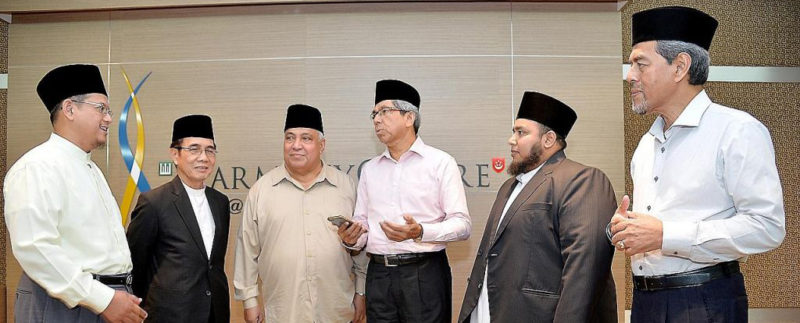newest article

MANDATORY ASATIZAH RECOGNITION SCHEME
16 November 2018 3:42 am // Written by Firdaus Bin Yahya, Dr.;
Singapore has long been producing Quranic and religious teachers, as well as scholars. In 1954, a group of religious teachers and scholars led by the late Kiyai Ahmad Zohri bin Mutamim founded Pergas, an organisation in which they hoped will protect the rights of the local religious teachers.
In their struggles to protect and defend the rights of the religious teachers and scholars and to take care of their well-being, Pergas was crippled by the lack of a formal Singapore religious teacher register. Back then, the identifying of religious teachers were reliant on feedback from the general public, the personal testimony of the individual teachers and also their educational background.
Those who were recognised as religious teachers by Pergas could join the organisation as members. However, this system was not fool-proof as it was not easy for Pergas to know and keep tab on all those teaching the religion. This situation became problematic when the community questioned whether a certain individual is qualified to teach religious knowledge or could be regarded as a religious teacher.
When several cases of deviant teachings or skewed ideologies taught by individuals who proclaimed themselves to be religious teachers emerged, Pergas could take action only against those individuals who were its registered members. If they were not in its list of members, Pergas was unable to validate the status of these individuals. Several efforts were made to ensure that more religious teachers were included in the Pergas membership list which aimed to create a database for the community to know if these individuals were legitimate in their claims as religious teachers.
The need to establish a database for all Islamic religious teachers in Singapore, regardless if they were members of Pergas or not became more urgent in the late 1990s. At that time, the community was shaken by the case of a certain religious teacher with Singapore citizenship who was caught and charged in a neighbouring country for having more than four wives at one time. Unfortunately, the idea of establishing the Islamic religious teacher database did not materialise due to a lack of support from Muis.
In 2001, the community was once again shaken by the news of the existence of extremist group the Jemaah Islamiyah (JI) whose vision was to create chaos in Singapore. Their mission was to create tension and civil strife between the Singapore Muslims and non-Muslims so that they could eventually set up an Islamic Nation in Singapore and within the South East Asian region. Their evil plots of planting bombs in several areas in Singapore were discovered and their teacher and members were apprehended.
Following this incident, Pergas’s idea to have a database of Islamic religious teachers was again raised and this time, it was well-received by Muis. It even received support from the government. Efforts to create and maintain the database then began. In 2005, a database which resulted from this collaborative effort was officially launched by Muis and Pergas.
This database also serves as a platform to acknowledge and recognise the credibility of a religious teacher to teach. From this, the Asatizah Recognition Scheme (ARS) was founded. A committee was formed specifically for this scheme. The ARS works on a purely voluntary basis, as there was no law requiring all Islamic religious teachers to register themselves under the scheme and be accredited for their role as a religious teacher.
To help attract more religious teachers to register with the scheme, MUIS agreed to conduct training programs and coursework for the religious teachers who have already done so to improve their skills and abilities to perform their duties and to their responsibilities as inheritors of the prophets.
At this point, although the ARS was well-received by the government, the entire cost of running and maintaining this scheme was funded by the Muslim community itself. There was no any financial assistance from the government due to its secularist policy.
Through this scheme, more religious teachers were ready to be accredited and recognised. Many of them were motivated by the incentive of being able to teach in the local full-time madrasahs and the local mosques. This is because Muis issued a regulation that only religious teachers who are accredited and recognised under the ARS are allowed to serve in spreading religious knowledge in the madrasahs and mosques.
With the scheme running for 11 years, the Muslim community was taken in by surprise with the announcement made by the Prime Minister of Singapore, Lee Hsien Loong in the National Day Rally 2016. He announced that the ARS would be made compulsory upon all religious teachers. In other words, anyone without the ‘license’ to teach Islam, would not be allowed to teach in Singapore under any settings; in the madrasahs, mosques, private institutions and even at home. This regulation was implemented on 1 January 2017.
Reasons for the mandatory enforcement of ARS
Many have raised concerns and questions about the implementations of the ARS, especially on the reasons and intentions in making it mandatory upon all Muslim religious teachers in Singapore. Among these concerns are:
- Why is it compulsory only for Islamic missionaries and Islamic religious teachers to register themselves in order for them to be able to teach the Islamic faith? Why does this ruling not apply to teachers of other faith as well?
- Is enforcing the ARS upon the religious teachers a method the government uses to monitor and ensure who is qualified to teach?
- Is the ARS an idea mooted by the government?
- How come this ruling is also applicable to Quran teachers who only teach Quranic literacy and memorisation techniques and are not involved in teaching the tenets of the religion? What is the purpose of them also being controlled by the government?
- Why is the secular non-religious government meddling with issues pertaining to the practice and understanding of religion?
Efforts to look for answers to the above questions need to begin by understanding why the ARS was made mandatory. This will then be followed with a scrutiny of the principles which were set specifically to be pillar and power of the compulsory ARS.
Many assumed that the idea of enforcing the ARS comes from the government. This is especially so since the Prime Minister announced it at the most important national platform – The National Day Rally. They are also of the opinion that the government is taking measures to control and oversee how the Islamic religious teachers are doing their work, in light of the global phenomena of extremism and violence that has been linked to the Islamic faith and its followers.
In actual fact, the move to make the ARS compulsory and mandatory was not mooted by the government. As a secular nation, the government holds fast onto the principle of not meddling into the affairs of the teachings and practices of every religion, except on the occasion in which it affects the peace and harmony of a multi-racial and multi-cultural society and if it threatens the safety of the nation.
The request for ARS to be made mandatory actually came from an established group of senior religious teachers who sit on the Asatizah Recognition Board. This board operates under the guidance of Muis and Pergas. The board has no legal rights or power since fundamentally, the enlistment under ARS is on a voluntary basis. The religious teachers do not need to register with the ARS to teach. Being registered is simply an added value to those who are registered.
It is a given that the general Muslim community respect and have high regards for religious teachers who are regarded as a class of highly pious and knowledgeable persons in matters of the faith. On this basis as well, the community has high expectations of them from the morality and piety perspective. Behaviour considered normal and acceptable from the general public will not be accepted by them should the same behaviour be displayed by the religious teachers group. What more, if the religious teachers were to commit a big sin or crime.
Nevertheless, religious teachers are but humans themselves. When there are more of them, there are bound to be a handful who do not adhere to the moral standing expected of religious teachers. This situation is likened to the Malay proverb which states, in every bunch of bananas, there is bound to be a rotten one. Hence, the more bunches of bananas there are, the more rotten bananas there would be.
Cases of religious teachers behaving badly, committing grave sins and committing criminal acts are on the rise. Some of these religious teachers are already registered under the ARS. If they continue to be obstinate and behave in a manner which is against the religious rulings, norms of society or national laws, the Asatizah Recognition Board will revoke their accredition.
This revocation of their accredition means that the teacher would not be allowed to teach in any local mosque or madrasah. However, they can continue teaching from homes and in private institutions which they may have themselves set up. The Asatizah Recognition Board would not have the power to stop these ‘religious teachers’ from teaching there and the community would continue to be exposed to the dangers of their teachings.
On this basis, the established group of senior religious teachers sitting on the Asatizah Recognition Board saw the importance of the ARS to be given the legal authority to completely stop these errant individuals who deviate from the true teachings of Islam. In other words, they want the legal authority irrevocably ban religious teachers who display misconduct or break a law from teaching ever again.
This aspiration of the Asatizah Recognition Board is probably in line with the desire of the government to ensure that the Muslim community is not exposed to any teachings brought by local and international speakers which would threaten the peace, harmony and security of the nation.
Hence, the ARS was upgraded from a voluntary accreditation scheme to a compulsory one.
This is the reason the religious teacher’s recognition scheme is only applicable to the Muslim community and not to other religious groups. The religious scholars of other faiths perhaps have not requested the government to make the recognition of their teachers compulsory. They probably would have their own methods and ways to handle and discipline errant teachers, without needing the government to step in and assist them with the law.
Mandatory ARS Regulations
After the government responded to the request of the senior religious teachers from the Asatizah Recognition Board to make the ARS compulsory upon all Islamic religious teachers and in addition to the Prime Minister’s announcement at National Day Rally, Muis got the ball rolling by developing the legal framework under the AMLA (Administration of Muslim Law Act).
AMLA is an act relating to the Muslim community. It was established and passed in 1966 and it encompasses every aspect of the lives of Muslims in Singapore.
There are two sections in this act that can be applied to make the ARS compulsory. The first is Section 87 which addresses religious schools and the second is section 139 which relates to deviant teaching.
Several discussions took place between Muis and the Attorney’s General Chambers. After studying both sections, they found that Section 87 is most appropriate to be used to pass the new ruling that makes the ARS compulsory.
On the other hand, Section 139 only covers deviant teachings, In some cases, the misconduct committed by the religious teachers are not from their teachings but from their moral misconduct. This meant they cannot be charged under the deviant teachings law which carries the penalty of a fine of not more than $2,000 or a maximum imprisonment of 12 months or both.
Under paragraph 9 of Section 87, MUIS was given the legal authority to amend any clauses to ensure the fulfilment of the requirements of Section 87, which are to coordinate, observe and register all Islamic religious schools.
To apply Section 87(9) in making the ARS compulsory upon religious teachers, MUIS needed to re-define the term ‘religious school’. While the old definition of the term ‘religious schools’ referred to full time madrasahs only, this new definition does not only refer to the full time madrasahs, but any other institutions which run classes regularly whereby the teacher is not connected to the students by any familial ties.
With this new definition and upon consultation with the Attorney’s General Chambers, MUIS implemented new regulations under the power given by section 87(9) which bans any religious teachers who had been revoked from the ARS from carrying out any teaching activities.
The establishment of this Mandatory ARS regulation encompasses three aspects: regulations pertaining to religious schools, regulations pertaining to religious teachers and Al-Quran teachers and the ethical code of conduct of religious teachers and Al-Quran teachers.
To close any opportunities for anyone without the ARS accredition to teach and spread the Islamic faith, this regulation includes all places where regular Islamic classes could be held. These include mosques, madrasahs, private institutions or even homes.
Those who would like to organise regular religious classes in Singapore must apply for a permit from Muis, provide their curriculum, syllabus, teacher’s profile, number of students and any other details that Muis may require from time to time.
Anyone who wishes to teach Islamic knowledge and the Al-Quran would need to apply for accredition from Muis. Even if the person has a degree in the field of Islamic knowledge or is a highly accomplished Al-Quran teacher, he is still not allowed to teach as Muis would extend the accredition for another 3 years, depending on this individual’s teaching performance.
A few requirements need to be fulfilled to determine if a person is qualified to teach the religion and the Al-Quran. One of it is the academic qualifications of that individual. This individual is also required to attend a 30-hour training session for religious teachers or a 10-hour session for Al-Quran teachers throughout the period where the accredition is given to them.
The ethical code found in the regulations of the Mandatory ARS contains the general guidelines of moral, approach and teaching methodology imperative for all religious and Al-Quran teachers to adhere to. Failing to comply to the ethical code would cause the said individual to be subjected to disciplinary action by Muis. If the individual does not rectify his behaviour, his accredition to teach would be revoked.
Any religious and Al-Quran teacher whose application is rejected or the accredition has been revoked can appeal to the Ministry of Muslim Affairs.
If he continues to teach while waiting for his appeal to be processed, this individual can be fined not more than $2,000 or imprinsoned not more than 12 months or both. The same law would also apply to anyone teaching Islam without accreditation and any religious institution who employs teachers without this accredition.
Evaluation of the Mandatory ARS
The Mandatory ARS ruling was enforced on 1 January 2017 and gives full authority to MUIS to control, observe, approve and stop any religious/Al-Quran classes and teachers. No one should be allowed to teach Islamic education and the Al-Quran without approval from MUIS.
MUIS is also the authority to control the quality of Islamic teachings and the teachers teaching it, hence directly curbing any attempts to spread deviant teachings by those who are not qualified to teach Islam.
In this aspect, the sanctity of the Islamic religious education can be protected from being tarnished by those hiding behind the façade of a ‘religious teacher’, but indulge in misconduct for their own personal benefits.
This regulation however, serves as a double edged sword.
Critics to the Mandatory ARS have posed this question: If Muis controls all the religious and Al-Quran teachers in Singapore, who controls Muis? Which body would be the authority to curb MUIS if this regulation is manipulated to attract accreditation of religious teachers who are legitimate on paper but teaches the wrong ideologies?
If there are such claims that the Asatizah Recognition Board has the authority to curb Muis from doing so, the claim has no basis whatsoever.
The Asatizah Recognition Board is in actual fact not supported by law. It is just a small unofficial committee set up by Muis to assist it in determining who are qualified to teach and who are not. Muis, by law is not under any obligation to concur to any recommendations made by the Asatizah Recognition Board.
It would also be baseless to claim that Pergas would have a say since it initiated the ARS and collaborated with Muis in setting up the ARS Board.
Pergas is just an organisation. It does not posses any legal authority under AMLA. Only Muis, ROMM and the Syariah Court are given legal authority under AMLA as statutory bodies.
With this Mandatory ARS regulation, the role of Pergas in the accredition process of religious teachers became redundant. In fact, the certificate of accredition of religious teachers can only display the MUIS logo. The PERGAS logo had to be deleted as it is only an organisation and not part of the government body. The Asatizah Recognition Board Logo had also to be deleted since from a legal perspective, it does not exist.
Where is the Mufti’s role in determining if an accredited person is qualified to teach Islam or not?
The Mufti does not play a role in the Mandatory ARS regulation. His role is only focused on his responsibility as the chaiman of the Fatwa Council. The Mandatory ARS regulation consults and refers to the Fatwa Council if any teachings are considered deviant or otherwise. Hence, the Fatwa Council can only issue a fatwa if it is consulted. Naturally, the Fatwa Council needs to take a passive role instead of a reactive one.
Therefore, the Fatwa Council has no authority to stop Muis in the occasion where Muis decides to revoke the accredition of any religious teacher.
With this Mandatory ARS regulation, the establishment of which madhab or school of thought and which version of Islam can be taught in Singapore rests on the shoulder of only one party i.e the Minister in charge of Muslims Affairs. The minister is given the authority to determine, if he wants, who should lead Muis, who should be recommended to the President of Singapore to sit on the Mufti’s chair, who should sit on the Fatwa Council and who should be in the ARS Board (if MUIS still wants the board to exist). Hence, this minister would have authority over all the spiritual mechanism of the Muslims in Singpore. With this Mandatory ARS regulation, he should be able, if he wishes, to shape the Muslim community in Singapore based on his understanding without any oppositions.
In the past, religious teachers could voice out their concerns if there were deviant Islamic teachings and perspectives being taught rampantly in Singapore. Today, that right to voice out their concern is subjected to approval from MUIS and eventually the Minister (since all appeals to MUIS would eventually be sent to the Minister). If the authorities are unhappy with these concerns, the accredition of these religious teachers can be revoked.
Hence, it is very important for the Muslim community to ensure that this ministerial post does not fall into the hands of anyone who colours the community’s Islamic faith and practices based on his private understanding of the religion. This is a complex issue, however, as the appointment of this post is done by the Prime Minister and not the Muslim Community.
In the current situation where Pergas has lost its authority to accredit religious teachers, Pergas can still be an important platform in ensuring that there is no abuse of implementations in carrying out the Mandatory ARS regulations. The official Pergas voice is not tied to this regulation. However, all religious classes conducted by Pergas can, in theory, be directed to be closed under this regulation and all full members of Pergas, in theory, can be stopped from teaching and eventually lose their sources of income.
Were any of these scenarios imagined by the senior religious teachers in the Asatizah Recognition Board last year? Most likely, yes. However, the question still remains: Were they consulted in the process of establishing the Mandatory ARS regulation?
Looking at the time between the announcement made by the Prime Minister in August 2016 and the implementation of the Mandatory ARS regulation on 1 January 2017, it is very clear that there was only four months for the regulation to be legislated.
This is a very short time and it did not give enough time for MUIS to receive feedback from the general Muslim community, specifically the religious teaching community (even if MUIS had wanted it). Feedback was only taken from the Asatizah Recognition Board and members of the Council headed by the Presiden of MUIS. This Council represents some of the Islamic organisations in Singapore.
An Arabic proverb states, “A decision made in a deliberated and calm manner is safer than an action done in haste, which would often invite mistakes.”
Perhaps, the time frame given to establish the Mandatory ARS regulation is too short. Perhaps if given more time, more perspectives can be collated from various parties and more importantly, the voices of the religious teachers can be heard and taken into account. Feedback which are limited to only those coming from the members of the Asatizah Recognition Board dan members of the Council would only produce feedbacks which are also limited.
Since the Mandatory ARS regulation is only established as a regulation passed out in the framework of AMLA, and not as an AMLA law, changes and corrections to the regulations would be easier to make.
We can only hope if more legislations are to be made, more time would be given to collate feedback from the different parties.











